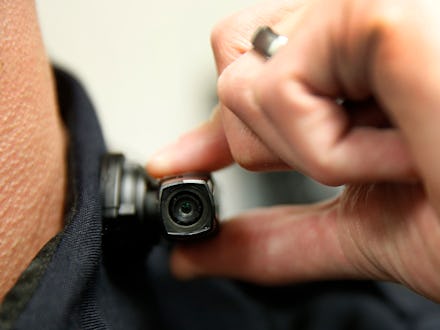The Murder of Walter Scott Shows How Important Police Body Cameras Are in the U.S.

Let's follow the lead of Mic's Zak Cheney-Rice: "Imagine there was no camera."
The murder of Walter Scott, a middle-aged black man who was gunned down by North Charleston, South Carolina, police Officer Michael Slager in broad daylight, has brought renewed attention to the issue of body cameras.
After the storm of controversy that accompanied conflicting reports about the murder of Michael Brown in Ferguson, Missouri, police departments across the country rushed to adopt them. In 2014, President Barack Obama requested $263 million in federal funds to help departments around the country equip their officers.
But is it working? The state of South Carolina allocated North Charleston a handsome $275,000 in February to equip their force with 115 new body cams. On the Saturday Scott was killed, Slager had not been wearing a body camera. A bill in the state legislature that would have mandated that "all law enforcement agencies must equip their officers with wearable video cameras," has been stalled in committee since it was introduced in January.
Marlon Kimpson, a Democratic state senator who represents North Charleston, offered a defense, telling Mic that far from negligence, the problem was one of a delayed delivery. "They went through a vending procurement process which took time," he said. "He wasn't wearing it because the equipment hadn't arrived yet."
The promise of body cameras. Aside from documenting malfeasance, the promise of body cameras has radically transformed a number of police departments around the country. The improved relations they can foster go far beyond preventing tragedies like those in North Charleston.
A recent report on San Diego, California, found that complaints against police had fallen by 40.5%, while the use of "personal body force" by law enforcement had decreased by 46.5% since the city introduced body cameras in January 2014. Deputy Chief David Ramirez hailed the findings, saying in the report that "body-worn camera technology is a win-win for both the officer and the community."
The Golden State scored again with body cameras in the city of Rialto, which saw even more dramatic results when they began mandating them in 2012. In a controlled study monitoring the use of body cameras, the city found an 88% reduction in police complaints. The use of force by officers fell almost 60%.
Recently, departments stretching from Portland, Oregon, to Lowell, Arkansas, to Rome, New York, have adopted body cameras. A captain from Rome's police department previously told Mic that "on many levels [the adoption] is an improvement."
Limits. Success in some places, however, is usually tempered with a grain of salt elsewhere. In Staten Island, New York, a passerby captured police Officer Daniel Pantaleo choking Eric Garner to death for selling cigarettes on the street. Despite video evidence showing Garner literally gasping for his life, Pantaleo was not indicted. The film was not recorded on a body camera, but the footage existed nonetheless.
Captain David Duff of the Dade City, Florida, police department was considerably less enthusiastic. According to Duff, Dade City, which also adopted body cameras around the same time as Rialto, has not seen comparable results.
"If a guy's gonna fight you, he's gonna fight you," he told Mic. "I think officers do the best they can do."
Duff, a 30-year veteran of Dade City, said the city had about 15 cameras, but that three or four were broken. Officers were also given wide discretion over when and where to turn them on. And as for that money President Obama promised?
"Haven't heard of it and we don't have any," Duff said.
So what happens next? With an overall trend pointing in a positive direction, it would seem, even with their faults, adopting body cameras will provide more benefits than not having them at all.
"I do think there are other Walter Scotts out there that did not have the benefit of video evidence," Kimpson told Mic, adding that he was pushing a bill to make body cameras mandatory in the state. The mayor of North Charleston also echoed previous commitments, saying that every officer would now carry one, and that for good measure he was ordering 150 through an executive order.
One shaky video taken by an anonymous bystander was the only thing that prevented a heinous miscarriage of justice. Body cameras may not be a cure-all, but they would be a damn good start.